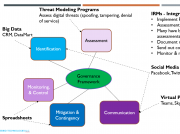Written by: Jacqlyn Shelton
Retrospective Meetings provide essential feedback that generate process improvements for each iteration of an agile project cycle.
Overview
Ordonna Sargeant (PMP, Certified Scrum Master, LSSGB, @ABlackPMP) explained how to structure a fun and engaging Retrospective Meeting that analyzes and evaluates a project to:
• Develop a list of critical steps in each iteration of an agile project to improve processes.
• Generate team synergy, growth, honesty, and commitment.
Team Engagement: Leaders can engage team members using a variety of structures. Regardless of the method used, it is essential that the questions: “what worked well,” “what didn't work,” and “how should we move forward" are answered. An example of a retrospective structure is the “Start, Stop, Continue” structure:
a) Start Process List (What should we start doing);
b) Stop Process List (What should we stop doing); and
c) Continue Process List (What is working well and should be continued).
The goal is to align the team so they can evaluate and improve the processes. All owners and development team members must be encouraged to engage in the discovery; asking team members questions can promote participation. Additional Retrospective Structures are:
• What? So What? Now What?
• Liked, Loathed, Longed for, and Learned
• Wishes, Risk, Appreciation, and Puzzles (WRAP)
Meeting Tools: A retrospective meeting requires the leader to actively engage participants in an analytical analysis that identifies issues and provides input to improve processes. Leaders must create an engaging environment of relaxation, participation, and excitement. Utilize:
• Communication Tools: Whiteboards and Webcams.
• Feedback Resources: Discussions, Polling, and Surveys, during and after the meeting.
Challenges: Identify when Lack of Engagement and/or Groupthink creep into a meeting; both can hinder the purpose of the retrospective meeting. Ask open-ended questions throughout the session to all team members to initiate project engagement, commitment, and team growth.
Informing the participants that their honest observations are valued and needed throughout the meeting will encourage an open forum of individualism that generates valuable ideas.
Takeaways
• Create a safe space for involvement and feedback.
• Encourage the team to think in action-oriented terms.
• Engage inclusiveness from all team members.
• Identify small results that lead to significant improvements.
• End the meeting on a high note, a positive reflection of results from the session.
Next Event
Join us at the next PMI Atlanta Agile Forum on Tuesday, October 20, 2020, 6:00 pm – 7:15 pm.
Keynote Presentation: “Demystifying the Scaled Agile Framework” Presenter: Josh Kite
Register at www.pmiatlanta.org/events/event-calendar
About PMI
Atlanta Chapter serves Project Management Community in Metro Atlanta, and we're an active resource to corporations, community and government agencies throughout north Georgia. With over 5,000 members, PMI Atlanta is among the top 5 chapters in the world. Our professional expertise span across industries; we’re the professionals building healthcare information technology systems, the engineers developing smarter public transportation, and the planners growing our communities more efficiently.





